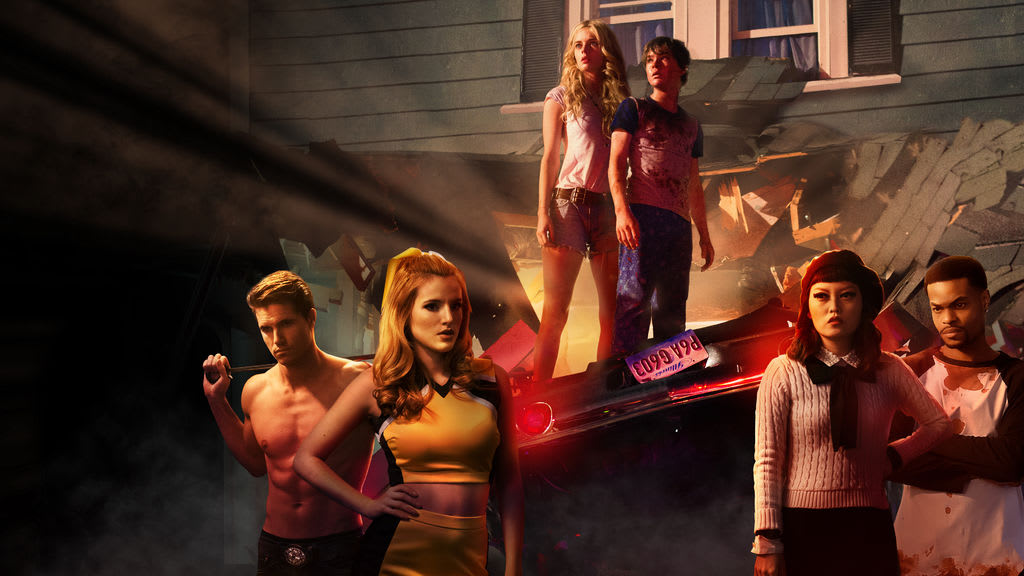
While Douglas Pipes' name might not be one the entire world is familiar with, everyone should really be paying close attention to what he's working on—especially now that he has Netflix's The Babysitter on his list of credits.
After doing a tremendous job scoring both Monster House and Krampus, it came as no surprise to learn that Pipes composed the score for Netflix's latest greatest, The Babysitter. In it, he turns every terrifying fun scene into one great adventure with a soundtrack that fits perfectly with the tone of the film.
Horror Composer, Douglas Pipes
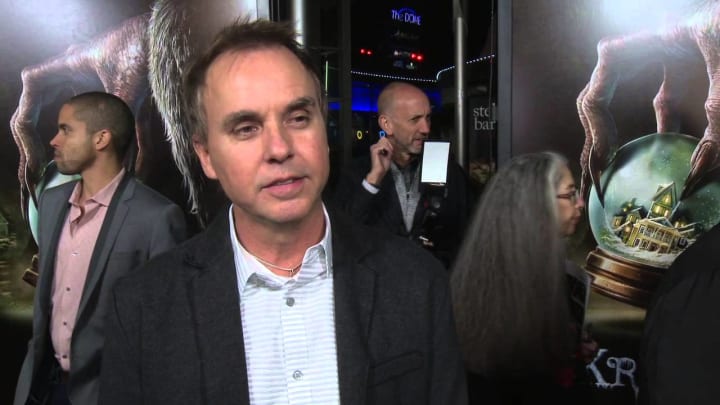
Douglas Pipes at Red Carpet premiere of Krampus (2015)
Does A Film's Score Make The Movie That Much Better?
Whether we realize it or not, it's the sound that really adds to the experience of watching a horror movie. Who can't say the menacing sound of Jason stalking campers in Friday The 13th didn't scare them right out of their seats? Without that ominous echo constantly ushering in the mad killer's entrance, the anticipation of seeing a psycho killer on the loose isn't there. So, when Douglas Pipes gives a horror-centric movie like The Babysitter an equally adequate score, his work should definitely be under analysis.
In light of his work with The Babysitter, we sought Pipes out to ask him a few questions in regards to his experience scoring the film. For our first question, we asked Pipes about how he went about creating the perfect balance of sound for a film that shifts from being extremely upbeat to absolutely terrifying in an instant.
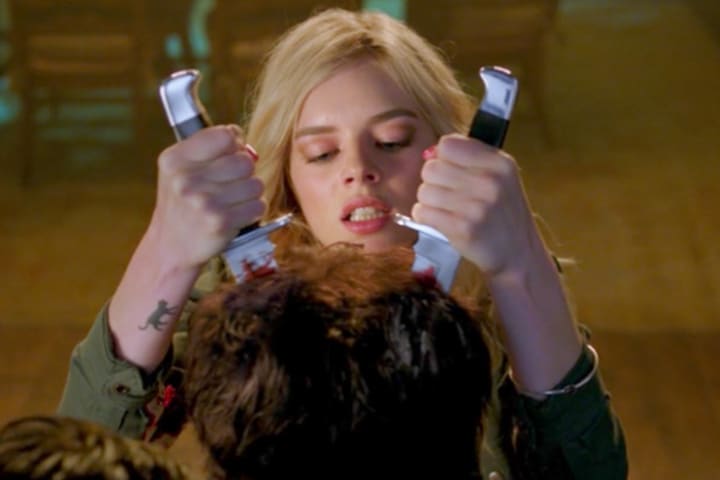
The Babysitter [Image Credit: Netflix]
Douglas Pipes Explains Balancing The Different Themes In Netflix's The Babysitter
If you haven't seen The Babysitter, at about a third of the way into the movie, the mood turns from a party like atmosphere to a suspense filled joy ride. When that shift takes place, the sound goes with it. For a bit of insight into how Pipes developed said transition, he provided the following comments:
"There are times when scoring a horror film you want to set up an uneasy tension at the beginning of the film, even before anything has really happened to let the audience quickly get into the atmosphere of the film. The Babysitter is not a traditional horror movie, and the coming of age story is just as much a part of the story as the horror storylines. The movie opens up more like a John Hughes movie, and I found this really compelling when I first watched it. I was so interested in the two main characters that when it turns, it really knocks you over. The music had to follow the innocence of Cole’s character to make Bee’s darkness so impactful. As for the fun moments, McG uses songs to play the coming of age soundtrack and for the lighter moments in the score, I and my collaborator, John Clement Wood created song like cues to add to this youthful soundtrack. Once the horror kicks in the score gets much more dark and intense, but still finds moments to let the character motivations come through. A favorite of mine was scoring the relationship between Max and Cole, and without giving anything away, it's a charming yet still terrifying interplay."
Apparently, scoring The Babysitter wasn't like working on a traditional horror movie. According to Pipes, he compares the beginning portion to a John Hughes style of film, emphasizing that it's a coming of age story which turns into a horror movie. The music accompanying the film had to match up as it centered around Cole's maturation, which is where Pipes' focus. But, when the film turns into a slasher flick—the sound goes in a completely different direction.
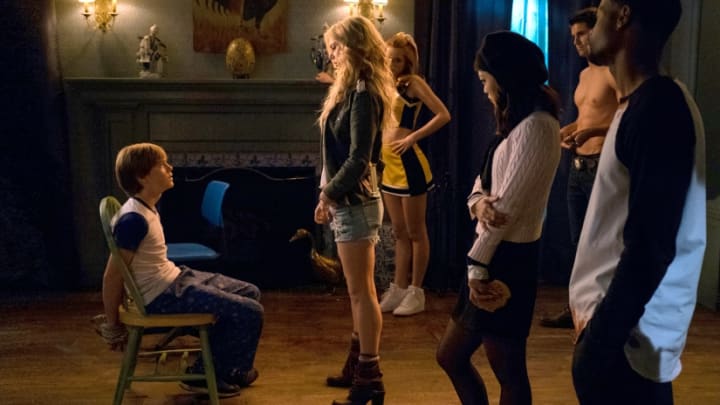
The Babysitter [Image Credit: Netflix]
Pipes Also Had Help From McG, John Clement Wood, and Jon Kull While Working On The Babysitter's Score
Apart from Pipes' influence in composing the score, he credits McG for setting up meetings for the music team to coordinate each working part of the film's score. Adding that McG has some insight into how creating music works:
"I had music meetings with McG (the director), and all music matters were under his direction. He invited the producers, the editor, and the music supervisor to these sessions and we listened to the score at intervals in the compositional process, and then I would get input from them. These sessions were really creative with everyone over at my composing/recording studio listening to the music score and discussing ideas. McG loves music, understands music creation and really fosters and environment of experimentation. Hope they do a sequel."
As for the rest of the team involved in crafting the soundtrack for The Babysitter, Pipes mentioned that his collaborations include John Clement Wood and Jon Kull. Both Wood and Kull have worked with Pipes in the past and appear to be part of his main team. Pipes had this to say about their involvement in the film's score:
"Film scoring on a modern film schedule requires a music team. There is simply too much to do in such a short amount of time. The size of the music team on any given project depends on the film’s budget and time constraints (sometimes the edit is being finalized as the music is being finalized). Orchestrators, copyists,programmers, music prep, etc. As for scoring, when I have some additional scoring needs I am fortunate to have two brilliant composers that I work with as part of my core team. On The Babysitter, John Clement Wood, who I have worked with since Trick ‘r Treat composed or co-composed some of the song style cues, working his magic on vintage drums machines, tape decks and synths. Jon Kull, who has been my main orchestrator since Monster House, orchestrated the string orchestra on The Babysitter. He also composed and arranged some additional music on Krampus."
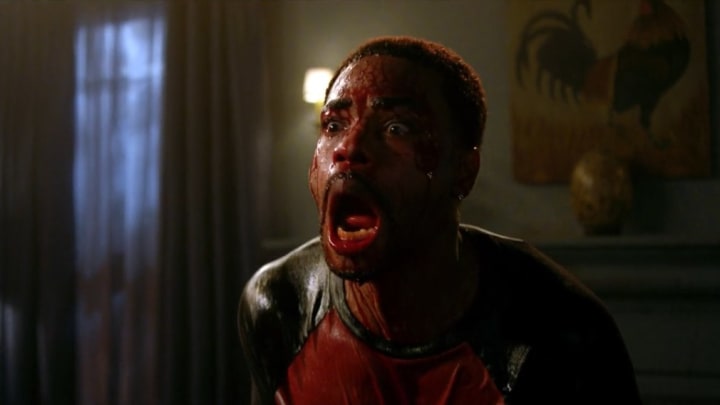
The Babysitter [Image Credit: Netflix]
How Douglas Pipes Approaches Creating The Sound For Suspense Driven Scenes
In addition to taking time to talk about The Babysitter, Pipes also provided a little background on his approach to composing the sound for suspense filled scenes, in general:
"One thing I really focus on in suspenseful scenes in particular is space, both vertically and horizontally. Sorry to be technical so let me explain. What I mean by that is not making the music so dense (the vertical) that it cancels out the effect the natural sound sounds and sound effects, the wind, creaks, a character’s breathing….the really creepy stuff. Also I try to find ways to include silences in the music (the horizontal). I like using starts and stops and altering rhythms to help keep things unsettled. Dynamics are very important to me. Melodic fragments can help these starts and stops and help keep the viewer off balance, or cutting a melody off when you feel it has a few more beats to resolve."
As you can see, Pipes knows what he's talking about. He delves quite heavily into the technical side of scoring horror movies but the knows what he's talking about. From directional sound to melodic fragments, it's like a different language to most of us. Pipes, on the other hand, knows these aspects of film-making quite well. His masterful work on The Babysitter proves this and then some.
Trick 'r Treat vinyl cover
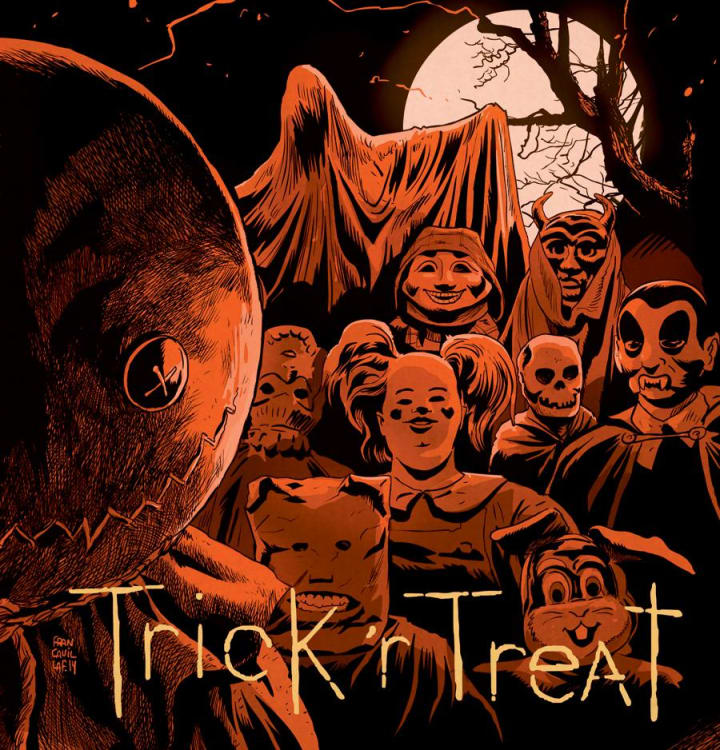
Trick 'r Treat [Image Credit: Waxwork Records]
Douglas Pipes' Other Notable Mentions Of The Year
After our discussion on The Babysitter ran its course, Pipes went to talk about another film he worked on earlier this year, Awaken The Shadowman.
In Awaken The Shadowman, the film follows Adam Morris (James Zimbardi) as he deals with the mysterious disappearance of his mother. This leads to Adam reuniting with his estranged brothers, and then the discovery of a supernatural force lying dormant within their hometown.
When we asked Pipes to elaborate on his contributions to the film, he responded with the following:
"That is a micro budget suspense movie that I had a really great time composing a mad-scientist-in-the-lab score… most of the score is analog synths and metallic resonances. It is very different from any of my other scores, and if you are a fan of retro sounding synth scores please check it out! It features some great analog synths in the hand knob twisting way… not sequenced or programmed. I really love the score and am so happy La La Land Records released it on CD and digital."
According to Pipes, Awaken The Shadowman is much different from his prior work. He emphasizes that a lot of the sounds are retro sounding, which involve non-sequenced analog synths. This aspect of music / film-making is yet another embroiled in the technical side, so only those familiar will understand. But to sum it up, analog synths can be broiled down to devices that create sounds electronically. Unlike your average musical instrument, an analog type of setup uses nobs to generate sounds automatically. Pipes' use of this system shows how versatile he is as a composer, and the level of work he's capable of.
For our final question to Pipes, we had to ask him about the exciting re-release of his score for 2014's Trick 'r Treat. It was released on vinyl in the same year and completely sold out. This surprised many fans and left many others wanting a copy. No other reprints were scheduled at the time, but a re-release was made earlier this year. Pipes had this to say in regards to the news of Trick 'r Treat's reprinting:
"I can’t even begin to tell you how exciting the original vinyl release for Trick ‘r Treat was. I know that there were some labels interested in it as vinyl was just starting to make a come back. Kevin Bergeron at Waxwork Records showed what he had planned for the release and I was blown away when I found out. They took such great care in working with Michael Dougherty (The director) and me and really put their souls into that release. Francesco Francavilla created incredible artwork for it and it came out stunning. I would hear from people that didn’t get it before it sold out and wondered if it would get a re-pressing and now it has! Plus, it’s the picture disc version which is incredible. Trick ‘r Treat fans out there should grab this while there are still some copies left. Also, I recently worked with Kevin on there latest endeavor Waxwork Comics, which come with a 7” vinyl featuring a music to accompany the stories. Volume 2 coming soon as well!"
For those of us who aren't die-hard fans of Trick 'r Treat, it's quite a surprise to hear that its vinyl release sold out before every fan who wanted one could get their hands on one. And while the film might not be as widely recognized as it should be, Trick 'r Treat is turning into a cult classic. All things considered, Pipes contributions to composing the the film's score definitely make this vinyl one worth picking up—at least while they're still available.
Douglas Pipes’ film scores are available at Waxwork Records, La La Land Records, Varese Sarabande Records, iTunes, Amazon, and other retailers.
About the Creator
Allie Z.
I cover most entertainment related topics and am venturing into journalism.



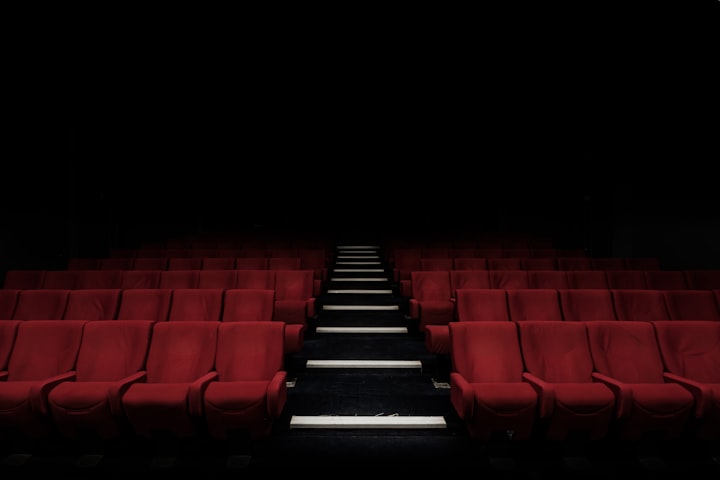


Comments
There are no comments for this story
Be the first to respond and start the conversation.